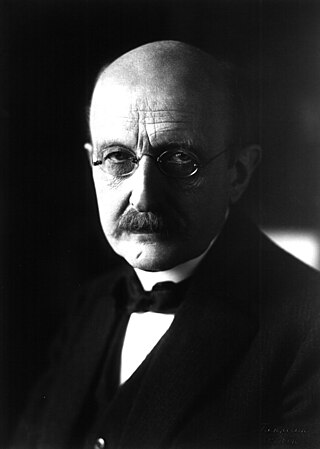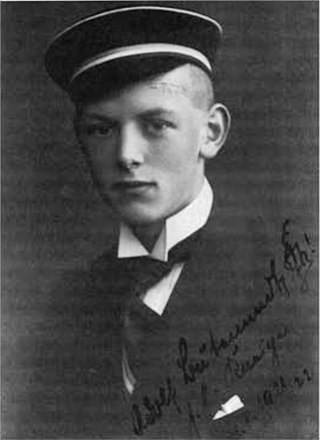Related Research Articles

Max Karl Ernst Ludwig Planck was a German theoretical physicist whose discovery of energy quanta won him the Nobel Prize in Physics in 1918.

Max Born was a German physicist and mathematician who was instrumental in the development of quantum mechanics. He also made contributions to solid-state physics and optics and supervised the work of a number of notable physicists in the 1920s and 1930s. Born won the 1954 Nobel Prize in Physics for his "fundamental research in quantum mechanics, especially in the statistical interpretation of the wave function".

The University of Göttingen, officially the Georg August University of Göttingen, is a public research university in the city of Göttingen, Germany. Founded in 1734 by George II, King of Great Britain and Elector of Hanover, and starting classes in 1737, the Georgia Augusta was conceived to promote the ideals of the Enlightenment. It is the oldest university in the state of Lower Saxony and the largest in student enrollment, which stands at around 31,600.

Manfred Eigen was a German biophysical chemist who won the 1967 Nobel Prize in Chemistry for work on measuring fast chemical reactions.

Bert Sakmann is a German cell physiologist. He shared the Nobel Prize in Physiology or Medicine with Erwin Neher in 1991 for their work on "the function of single ion channels in cells," and the invention of the patch clamp. Bert Sakmann was Professor at Heidelberg University and is an Emeritus Scientific Member of the Max Planck Institute for Medical Research in Heidelberg, Germany. Since 2008 he leads an emeritus research group at the Max Planck Institute of Neurobiology.

Adolf Friedrich Johann Butenandt was a German biochemist. He was awarded the Nobel Prize in Chemistry in 1939 for his "work on sex hormones." He initially rejected the award in accordance with government policy, but accepted it in 1949 after World War II. He was President of the Max Planck Society from 1960 to 1972. He was also the first, in 1959, to discover the structure of the sex pheromone of silkworms which he named as bombykol.

The Kaiser Wilhelm Society for the Advancement of Science was a German scientific institution established in the German Empire in 1911. Its functions were taken over by the Max Planck Society. The Kaiser Wilhelm Society was an umbrella organisation for many institutes, testing stations, and research units created under its authority.

Max Abraham was a German physicist known for his work on electromagnetism and his opposition to the theory of relativity.
Reimar Lüst was a German astrophysicist. He worked in European space science from its beginning, as the scientific director of the European Space Research Organisation (ESRO) from 1962 and as Director General of the European Space Agency (ESA) from 1984 until 1990.

Peter Gruss is a German developmental biologist, president of the Okinawa Institute of Science and Technology, and the former president of the Max-Planck-Gesellschaft.
The Max Planck Institute for Dynamics and Self-Organization in Göttingen, Germany, is a research institute for investigations of complex non-equilibrium systems, particularly in physics and biology.

Sami Khan Solanki is director of the Max Planck Institute for Solar System Research (MPS), director of the Sun-Heliosphere Department of MPS, a scientific member of the Max Planck Society, and a Chair of the International Max Planck Research School on Physical Processes in the Solar System and Beyond at the Universities of Braunschweig and Göttingen.

The Max-Planck-Institute of Quantum Optics is a part of the Max Planck Society which operates 87 research facilities in Germany.

Thomas Ludwig Albert Oppermann was a German politician and member of the Social Democratic Party (SPD). From October 2017 until his death he served as Vice President of the Bundestag. In his earlier career, he served as First Secretary (2007–2013) and later as chairman (2013–2017) of the SPD Parliamentary Group in the Bundestag.
Hans Robert Schöler is a molecular biologist and stem cell researcher. He is director at the Max Planck Institute for Molecular Biomedicine in Münster.
Andreas L. Paulus is a German jurist who has been serving as a Judge on the Federal Constitutional Court of Germany since 2010. He held the chair of general international law at the University of Göttingen. His research interests include international law, humanitarian law, and constitutional law.

Roger Sidney Goody is an English biochemist who served as director at the Max Planck Institute for Molecular Physiology in Dortmund from 1993 until 2013. Since 2013 he is Emeritus Director of the institute.

Petra Schwille is a German professor and a researcher in the area of biophysics. Since 2011, she has been a director of the Department of Cellular and Molecular Biophysics at the Max Planck Institute for Biochemistry in Martinsried, Germany. She is known for her ground-laying work in the field of fluorescence cross-correlation spectroscopy, and numerous contributions on model membranes. Her current research focuses around bottom-up approaches to building an artificial cell within a broader area of synthetic biology. In 2010, Schwille received the Gottfried Wilhelm Leibniz Prize.

Fritz Güntzler is a German auditor and politician of the Christian Democratic Union (CDU) who has been serving as a member of the Bundestag from the state of Lower Saxony since 2013.
Hartmut Lehmann is a German historian of modern history who specializes in religious and social history. He is known for his research on Pietism, secularization, religion and nationalism, transatlantic studies and Martin Luther. He was the founding director of the German Historical Institute Washington DC and was a director of the Max Planck Institute for History. He is an emeritus honorary professor at Kiel University and the University of Göttingen.
References
- ↑ "Scientists discover why sandcastles are really child's play". The Hindu . 11 February 2008. Retrieved 14 February 2011.